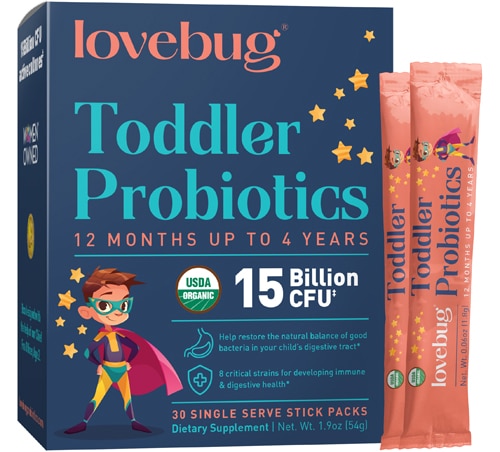From natural, fermented products to a host of supplements, you’ll find the presence of probiotics proudly displayed on many food items today. But what do probiotics do? What's all the hype about?
What do probiotics do and why do we need them?
Your body has more microbes than cells. In fact, your body is made up of more than 100 trillion microbes, which is 10 times more than the amount of DNA cells. Probiotics are beneficial and helpful bacterial strains that promote a balanced microbiome (gut health) and healthy digestive system. When you have a well-functioning digestive system, you feel better overall.
Probiotics supplements and their effectiveness are defined by the number of live bacterial strains that get past your stomach acid to support your gut. While most supplements provide a single strain, high-quality probiotics feature a variety of strains and effective delivery systems. For example, LoveBug Probiotics deliver eight different strains to your digestive system through its patented BIO-tract® technology, which makes their probiotics 15 times more effective than other brands.†
Where can you find probiotics?
Probiotics can be found in a number of fermented foods and drinks, including:
- Yogurt
- Buttermilk
- Miso soup
- Kombucha
- Sauerkraut
- Milk kefir
- Aged cheeses like gouda, edam, cheddar and emmental
It’s important to consume probiotic-rich foods. However, it can be difficult to consume enough of these foods on a daily basis. Taking quality probiotic supplements can help fill in any nutritional gaps when you don’t get enough live cultures from food alone.
What are the health benefits delivered by probiotics?
Probiotics are a rich area of scientific inquiry and research. And, so far, the prospects are exciting. Eighty percent of your immune system begins in your gut, so creating an environment with bacterial diversity can have positive effects on the strength of your immune system. There’s also the potential connection between gut bacteria and serotonin levels.
According to a 2015 issue of the journal Cell, more than 90 percent of the body’s serotonin is produced in the gut, largely by enterochromaffin (EC) cells. While the Cell study was only conducted on germ-free mice, it ultimately determined that serotonin production relies on specific bacteria to interact with the EC cells. With the presence of certain bacteria, the body can efficiently produce the serotonin it needs. This could be great news for probiotics, but human studies will have to pave the way first.
Do all probiotics offer the same benefits?
The short answer is no. Specific genus and strains of probiotics provide specific benefits. Choosing the right probiotic is essential for maximum effectiveness. To identify the best type of probiotic for your body’s needs, speak to your doctor or a registered dietitian.
At what age can you start taking probiotics?
An ideal time to start taking probiotics is when a child is in utero. Along with folate and fish oil, probiotics are the best dietary supplements for an expectant mother. Not only does a probiotic supplement support the mother’s immune system, but it introduces probiotics to the unborn child. According to a review published online in December 2014, a baby’s microbiome is seeded by his or her mom’s bacteria as they pass through the birth canal. The review detailed how several modern practices can affect this natural exchange of microbiota – and, ultimately, the baby’s total health.
The 2014 review compiled several studies that concluded these major factors can affect a baby’s microbiome:
C-section – The studies altogether concluded “disrupting the mother-to-newborn transmission of bacteria by C-section delivery may increase the risk of celiac disease, asthma, type 1 diabetes and obesity in the offspring.” In fact, C-section delivery was associated with a 46 percent increase in the risk of childhood obesity.
Antibiotics administered during labor – In human studies, antibiotics delivered during labor were associated with a decreased bacterial diversity in the baby’s first stool. One study showed that “children exposed to prenatal antibiotics in the second or third trimester had 84% higher risk of obesity compared with unexposed children.”
Formula feeding – Formula feeding and introducing solid foods too early in infancy can disrupt the natural colonization of microbiota. These studies concluded that even small amounts of formula during breastfeeding “can alter the structure and relative abundances” of bacteria normally found in a breastfed infant’s gut.
Of course, there are situations when a C-section is the safest option for the mother and baby. There are also cases where breastfeeding is simply not an option. The good news is that one study confirmed “formulas fortified with prebiotic and probiotic compounds may be restorative alternatives.” And, there are supplement formulations specifically for children, including Lovebug Probiotics Tiny Tummies™.
Can you take probiotics with vitamins?
Yes, probiotics do not affect – and are not affected by – letter vitamin supplements.
Can I take probiotics while taking oral antibiotics?
You can take probiotics while on antibiotics, and it is actually a good idea to do so. When prescribed correctly, antibiotics are often a life-saving medication. However, they do have a detrimental effect on your gut flora, as they kill the beneficial bacteria. Not surprisingly, one of the most common side effects of taking a course of antibiotics is diarrhea or digestive ailments.
By supplementing your diet with probiotics during this time, you can replenish the good bacteria in gut and ease any digestive problems. However, if you take the probiotic supplement at the same time or within a couple of hours of taking the antibiotics, the good bacteria in the supplement will also be destroyed. It’s best to wait at least two hours after taking an antibiotic before consuming probiotic-rich foods or popping a probiotic supplement.
Are there any negative side-effects of taking probiotics?
By and large, there are no known negative side effects of taking probiotics. Within the first few days of starting probiotics, you may experience mild symptoms like flatulence or bloating as your gut focuses on rebalancing its flora. If you have a severe health condition or weak immune system, it is best to consult your doctor before adding any dietary supplement to your daily routine.
Some probiotic supplements are priced economically, while some are expensive – what’s the difference?
The primary difference between the costs of probiotic supplements is the total number of live probiotic strains, as well as the diversity of strains that are in the product. Some supplements have few helpful organisms, while others contain billions of live cultures. It’s also important to note what other ingredients might be lurking in your supplement. Steer clear of added sugars, colors and artificial flavors. Sugar feeds the bad bacteria in your gut.
Ultimately, it doesn't matter how many colony-forming units (CFUs) are in your probiotic if they're getting killed off in the harsh acidic stomach environment. The key is to look for probiotics that ensure more of the good bacteria make it past the stomach acid barrier.
Where can I buy probiotic supplements?
Shopping for the right probiotic can be daunting. Make sure you compare a wide range of products and find the one that best suits your needs to ensure you’re getting the right probiotic.
LoveBug Probiotics offer a range of probiotic supplements for the whole family. Each formula is free of gluten, soy, sugar and GMOs. There are no undesirable ingredients, leaving more room in each tablet for helpful probiotics delivered directly to your gut through its patented BIO-tract® technology.†
†These statements have not been evaluated by the Food and Drug Administration. These products are not intended to diagnose, treat, cure or prevent disease.




